Action Pain-ing: The ghost of painter Jackson Pollock is a conflicted priest's confidant in Theatre NOVA's "SPLATTERED!"
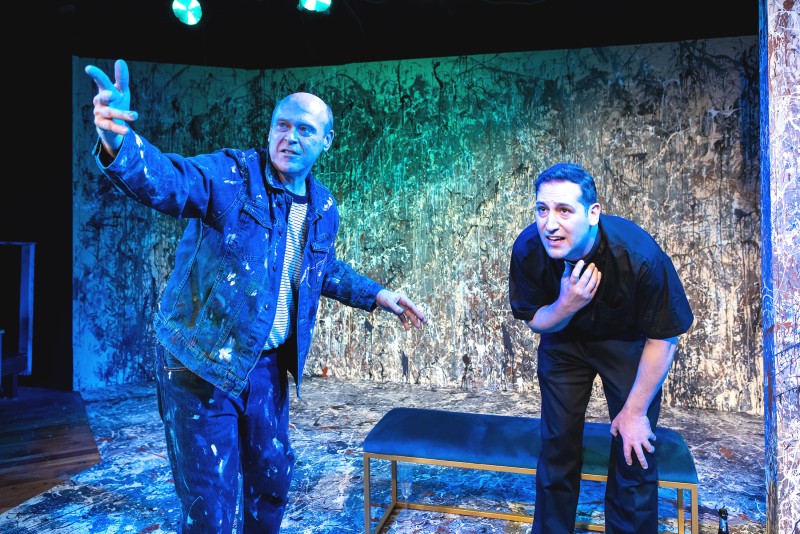
Conventional wisdom teaches us that “art heals,” but not usually via advice from a long-dead painter who suddenly reappears near one of his most famous works.
Nonetheless, this exact situation stands at the heart of Theatre NOVA's world-premiere production of SPLATTERED! by Hal Davis and Carla Milarch, directed by Briana O’Neal.
Set inside New York’s Museum of Modern Art, priest-in-training Justin (Artun Kircali) has snuck away from a wedding reception, with a champagne bottle in hand, to try and pull himself together. He’s just presided over the wedding of his cousin and best friend, Astrid (Marie Muhammad), but we initially don’t know why he’s drinking, cursing, and frantically praying in this gallery while confronting Jackson Pollock’s splatter painting “One: Number 31, 1950.”
But he’s not alone for long: Astrid soon finds him and, eventually, Justin’s old flame Sylvie (Allison Megroet) does, too. Yet it’s the surprise appearance of Pollock’s ghost (Andrew Huff) that provides Justin with an opportunity to unpack the unwieldy emotional baggage he’s carrying, which makes him reconsider his life choices and future.
SPLATTERED! runs a little over an hour, and other than two very brief Sylvie flashbacks, it unfolds in real time and the audience must work hard to piece together what’s happened between these characters in the past. During one early moment of confusion, I had initially guessed that Justin had been hopelessly pining for Astrid. Despite those initial thoughts, this short play doesn’t feel as fleeting as one might expect.
For Him the Bells Toll: Wild Up performed Julius Eastman’s "Feminine" at Rackham Auditorium
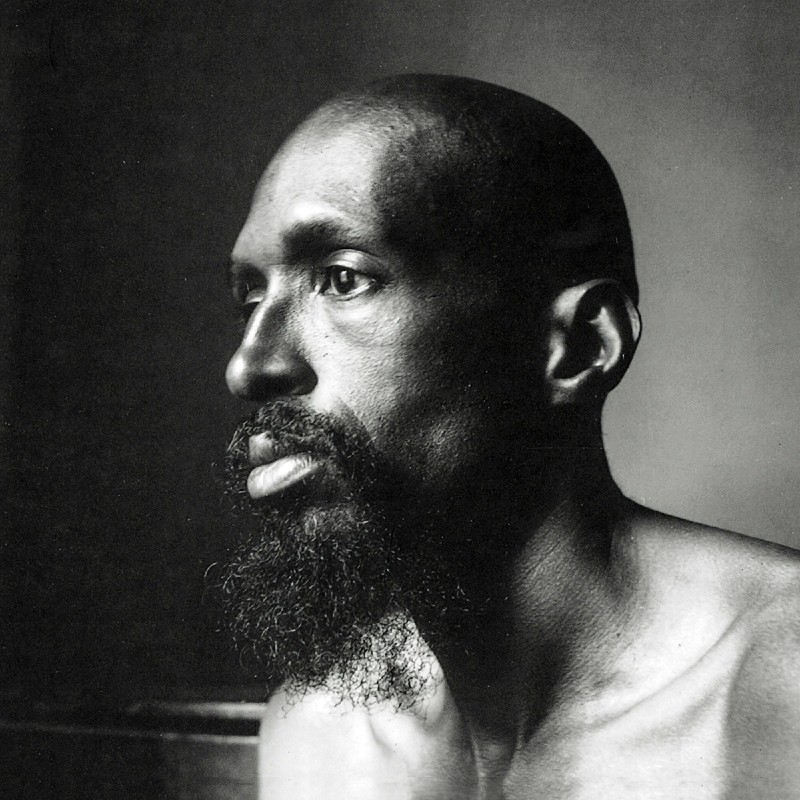
The sound of countless bells, gentle and cloudlike, opened Los Angeles-based chamber ensemble Wild Up’s presentation of Julius Eastman’s Feminine in Ann Arbor’s Rackham Auditorium on the afternoon of Sunday, April 17, as part of UMS’s 2022-23 season.
The bell choir—made up of Wild Up’s members, local musicians, and students from the University of Michigan School of Music, Theatre & Dance—lined the auditorium’s semicircular back. Set against the room’s painted ceiling, in which a darkening night sky extends outward from an intricately designed sun centered above the stage, the bells became stars. Their ringing emerged from darkness once the hall lights dimmed, and the enveloping sound welcomed the gathered concertgoers to an astonishing performance.
Julius Eastman (1940-1990) was a gay, African-American composer and performer whose career involved collaborations with titanic figures in 20th-century classical music such as Peter Maxwell Davies, John Cage, Meredith Monk, Morton Feldman, and others. Yet Eastman struggled to find sustained support from his colleagues and the musical institutions with which he interacted. When he died in 1990, it took eight months for a public notice of his passing to be published, and his legacy as a composer faced similar precarity.
Wild Up is an international leader in the contemporary effort to revive, record, and perform Eastman’s compositions. The ensemble's performance on Sunday confirmed all the praise it has received for the Julius Eastman Anthology project it launched four years ago.
Turn Down for What?: U-M’s production of “Rent” brightened the corners of the play's darker edges
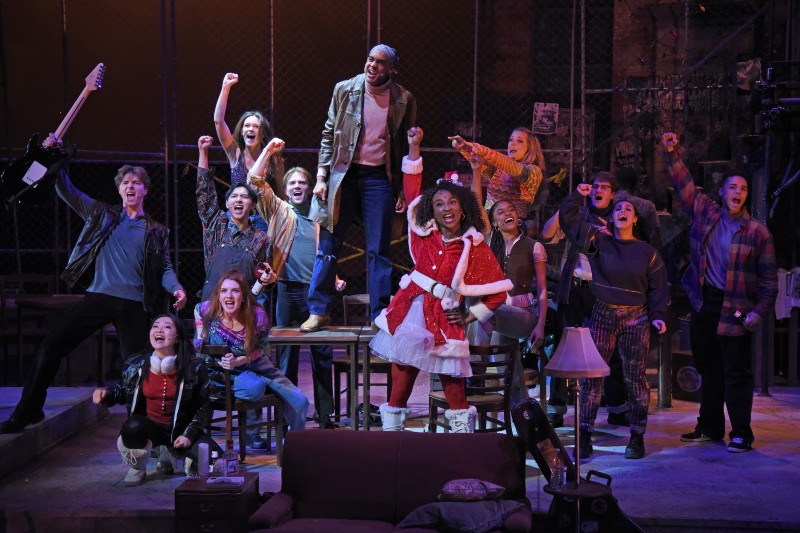
For me, it’s telling that the most moving moment of the University of Michigan’s School of Music, Theatre & Dance’s production of Rent on April 15 came via a curtain call reprise of the show’s iconic song, “Seasons of Love.”
Having taken their bows, the performers slowly clustered together in the middle of the stage, and you could palpably feel the camaraderie among them. That camaraderie didn’t radiate from their characters, but from their real-life experiences as college students, including graduating seniors, who’ve grown close while training and building on shows like this one. The warmth coming from that stage made my hair stand on end.
And in keeping with the program’s esteemed national reputation, the students had hit their marks and their notes (well, most of them) all evening. So why exactly did this polished production feel … well, too buttoned up and tame?
Luck of the Draw: "Everybody" bets on the lottery of life and explores the Big Questions

Is everything in life due to random chance or does everything really happen for a reason?
When it’s your time to leave this life, what do you hope to bring with you to the grave?
These are just a few of the introspective questions tackled in Branden Jacobs-Jenkins’s play Everybody, on stage at the Arthur Miller Theatre through April 9. The show is adapted from the play Everyman, which was first printed by an unknown playwright in 1530.
This semi-interactive show begins before you even enter the theater.
Rise and Shine: The puppet-filled "Waking Up!" at EMU is an all-ages feast for the eyes
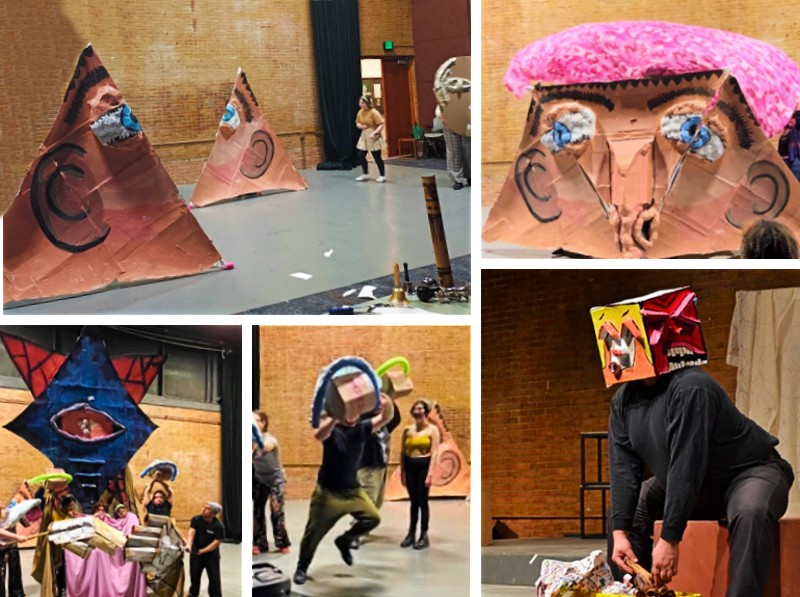
Color, music, and PUPPETS, oh my!
Waking Up! at Eastern Michigan University's Sponberg Theatre is a family-friendly devised show full of wonder, audience interaction, and play. It is perfect for audiences 8 and up and encourages booing, cheering, clapping, and laughing.
Senior MFA student Cameron Prevatte created and directed this piece of devised theatre—a collaborative production where an ensemble comes together to create something from scratch, without the aid of a set script. There usually aren’t traditional design elements either. For Waking Up!, nine students make up the ensemble: Jujuan Adams, William Clapp, Sebastian Dahlgren, Wesley Foster, Sarah Kucharek, Cameron Prevatte, Annabelle Rickert, Cassie Paige, and Ember Seth.
Prevatte comes from a background in puppetry and the show is filled with them. Some are huge, some are tiny, but all are interactive and play major roles in the stories.
The One-Woman Show “All Things Equal: The Life & Trials of Ruth Bader Ginsburg” Tries to Humanize the Late Supreme Justice

At a 2021 family funeral, one of my aunts, whom I hadn’t seen in decades, immediately guessed which car in the lot was mine: “I saw something with Ruth Bader Ginsburg on it hanging from the rearview, and I said, ‘Dollars to doughnuts, that’s Jennifer’s car.’” (Guilty!)
So, when I arrived at the Michigan Theater on March 14 to see the touring one-woman show All Things Equal: The Life & Trials of Ruth Bader Ginsburg by Rupert Holmes, the deck was already stacked.
But let’s be honest: I was hardly the only fan at the show’s packed Ann Arbor performance. As a feminist icon who arguably did more than anyone to advance women’s legal rights in the 20th century, RBG long ago achieved progressive, secular sainthood.
This ultimately poses a challenge for Holmes and his show, which stars Michelle Azar and is directed by Laley Lippard. How do you bring such a lofty figure down to earth and make her human?
Because frankly, despite Holmes structuring the play as an intimate talk between RBG and a couple of her granddaughter’s young friends in the justice’s chambers, it’s hard to not feel as if we’re prostrating ourselves at the altar of this powerhouse legal mind’s legacy.
Encore Theatre’s "Once on This Island" combines lilting songs, dynamic dancing, and caustic social commentary

Deep bass drums beat out a rhythm inviting people to dance. They dance to keep alive their spirits and their culture. They dance with joy, but life is never easy, even on a Caribbean island—especially when the island is Hispaniola and the country is Haiti.
Haiti is a troubled land. It has been hit hard by earthquakes, hurricanes, and a long history of unstable governments.
But the people of Haiti are resilient and fight back time and again. They also are in a divided country. There is a racial divide between the wealthy mixed-race elites and the struggling peasant class.
Once on This Island is based on Rosa Guy’s novel My Love, My Love. Lynn Ahrens’ book and lyrics for the musical Once on This Island combine a love story with a caustic take on class in the Caribbean. Stephen Flaherty composed the music that combines Caribbean beats for lively dances and soaring pop music for plaintive songs of yearning.
The Encore Musical Theatre presents an energetic, even passionate, production of the Ahrens-Flaherty musical through March 12 at the Maas Performance Center in Dexter.
Award-winning poet and writer Naomi Shihab Nye set her latest middle-grade-fiction novel, "The Turtle of Michigan," in Ann Arbor

Naomi Shihab Nye is best known for her poetry—she was chancellor of the Academy of American Poets from 2010-15, and the Poetry Foundation’s Young People’s Poet Laureate from 2019-21.
So perhaps it’s no surprise that her newest novel for young readers, 2022's The Turtle of Michigan, is built from subtle, sharply observed moments more than a page-turning plot. (It was recently named a 2023 Michigan Notable Book and will be out in paperback on March 14.)
Set in Ann Arbor—where Nye has taught writing—Turtle begins with eight-year-old Aref (pronounced “R-F”) and his mother taking off in a plane from their homeland, Oman. Aref’s father, having flown to Michigan a few weeks earlier, reunites with them at the Detroit airport, then drives his family to their new, small apartment in Ann Arbor.
An Honest Mistake: Purple Rose Theatre’s “Human Error” Uses Comedy and Relationships to Bridge the Nation’s Growing Political Divide

It’s no secret, this is a divided country. The chasm has widened between liberal and conservative, rural and urban, and religious and not so much. We don’t talk to each other; we scream at each other.
Playwright Eric Pfeffinger takes this disturbing truth and imagines what would happen if right meets left under unusual circumstances in Human Error, a comedy having its Michigan debut at the Purple Rose Theatre Company in Chelsea.
Madelyn and Keenan, described as NPR-listening, latte-sipping blue staters, have gone to a fertility clinic in hopes of starting a family. Unfortunately, as a nervous doctor tells them, their fertilized embryo has been implanted in another woman’s uterus.
Heather and Jim, described as small-government, churchgoing, card-carrying NRA members, agree to meet with Madelyn and Keenan, and after discovering they don’t have horns, Heather agrees to give the liberal couple the baby when it’s born.
Director Lynch R. Travis and his uniformly excellent cast do a good job of balancing Pfeffinger’s mix of broad comedy and heartfelt connections. The set is simple and spare. White chairs become a car, storage bins, and love seats. The stage backdrop is a set of curved gray-white walls for easy entries and exits. The audience is not distracted by scenery from the point the playwright hopes to make.
Carnal Letters: UMS's No Safety Net series closed with two Rachel Mars plays that explore the expression of desire
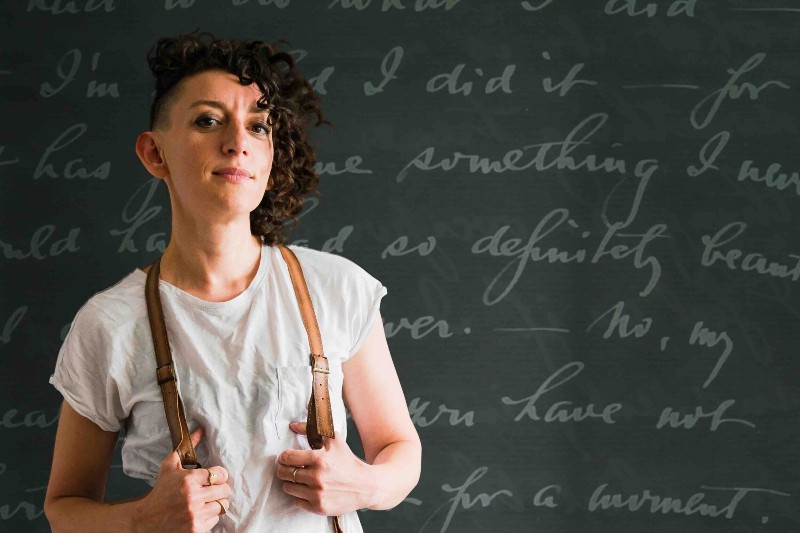
If there’s one common thematic thread between British theater artist Rachel Mars’ two shows, Our Carnal Hearts and Your Sexts Are Shit: Older Better Letters, it’s desire and the ways in which it’s expressed.
Both shows wrapped up UMS’s No Safety Net event series with Our Carnal Hearts quickly assuming the feel of a darkly comedic, secular church service complete with a small choir on a bare stage. It takes envy as its focus and explores how our ego reflexively ties itself in knots when a peer or loved one succeeds.
Mars even has the audience say, in unison, “Congratulations! I’m so happy for you!” in the same fake-enthusiastic tone we’ve all employed at one time or another in the interest of appearing like an adult instead of a petulant child.
Presented in the round, Our Carnal Hearts features a different singer—Rhiannon Armstrong, Rebecca Atkinson-Lord, Kelly Burke, and Louise Mothersole—seated in the middle front row of each side. It also combines cheeky musical asides composed and arranged by Mothersole, short audience interactions, and storytelling to plumb the question: why does another’s triumph inevitably make us feel small or less than?


































